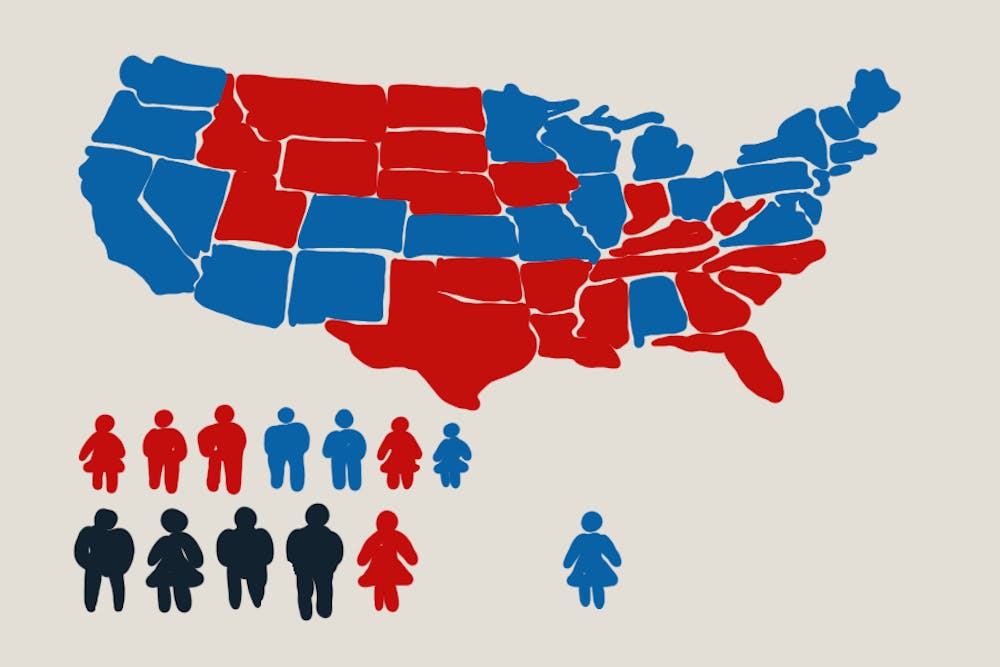With the presidential race still deadlocked, polling can only predict so much. While the popular vote is a good indicator of the presidential verdict, the Electoral College ultimately determines who wins the presidential race on Nov. 5.
The Electoral College is the process by which the president of the United States is officially elected. It is also not directly based on the popular vote, said James Strickland, an associate professor at the School of Politics and Global Studies.
When Arizona voters open their ballots on Election Day and find their preferred presidential candidate's name, they will see 11 more names alongside it — those names are electors from the Electoral College for the state of Arizona.
Gina Roberts, the voter education director of the Clean Elections Commission, said when voters choose a president on the ballot, that vote will then decide who the Electoral College will be for Arizona. It is “a slate of electors" for each presidential candidate.
The electors are those who officially decide on a presidential candidate. They are chosen by each party and traditionally cast their vote based on the popular vote of the state they are representing.
Each state receives electors based on their representation in Congress. Arizona has nine congressional districts and two senators, giving it 11 electors.
"Electors pledge to vote for the candidate from their party if that candidate wins the most votes in the state," according to the Library of Congress.
A presidential candidate will win the election when they are the first to earn 270 electoral votes.
"All eyes are going to be on that number," Roberts said.
Electors cast their vote at a previously decided date after the popular vote is over. For the 2024 election, electors will vote on Dec. 17, at the “meeting of the Electoral College.”
After electors cast their ballots, their votes are officially counted by Congress, Roberts said.
Congress will then count votes on Jan. 6, and the winning candidate will become president.
Even if the Electoral College is a staple in the process to elect a president, there can be concerning hypotheticals. Even so, they are rare situations, Roberts said.
If none of the presidential candidates reach 270 electoral votes, then the election becomes a contingent election. A contingent election means that it is Congress’ responsibility to decide who becomes president.
A contingent election has only happened once in the last 200 years, when in 1825, John Quincy Adams was elected president by Congress.
In the event of a contingent election, each state in the House of Representatives would be given one vote and states would no longer be represented proportionally.
"That would be the type of outcome where I would imagine there being a serious movement against the Electoral College," Strickland said.
There could also be an elector who attempts to vote for a different candidate than who they were pledged to. They are referred to as a "faithless elector," Roberts said.
"We're talking about a handful of electors every presidential race, and sometimes really it's meant to make a statement," Strickland said. "An elector may become frustrated with the major party nominee."
In Arizona, faithless electors are prohibited and if they make any faithless vote, it will be disqualified, Roberts said.
READ MORE: Where to vote on the four major ASU campuses
While there are some concerns, the Electoral College does make it so smaller states have a valuable input in who is elected, Strickland said.
"Students, when they are filling out that ballot, it should be exciting for them," Roberts said. "They are giving their voice to who they think our state's very important 11 electoral votes should be allocated to, and it could ultimately determine who wins the presidency."
Edited by George Headley, Sophia Ramirez and Madeline Schmitke.
Reach the reporter at ehprest1@asu.edu and follow @ellis_reports on X.
Like The State Press on Facebook and follow @statepress on X.
Ellis is a sophomore studying journalism and mass communication. This is her first semester with The State Press. She has also worked at Arizona PBS and Blaze Radio.




